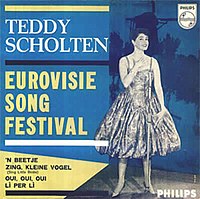| Revision as of 13:24, 28 January 2014 editEmausBot (talk | contribs)Bots, Template editors2,860,580 editsm Bot: Migrating 1 interwiki links, now provided by Wikidata on d:Q368653← Previous edit | Revision as of 17:08, 1 March 2014 edit undoIn ictu oculi (talk | contribs)Autopatrolled, Extended confirmed users, Page movers, New page reviewers, Pending changes reviewers180,557 editsNo edit summaryNext edit → | ||
| Line 21: | Line 21: | ||
| | next_link = Wat een geluk | | next_link = Wat een geluk | ||
| }} | }} | ||
| ''''n Beetje''' (A little bit), sometimes incorrect spelled as '''Een Beetje''', was the winning song of the ]. Performed in ] by ], the song was the second victory for the ] in the first four years of the contest's history. | ''''n Beetje''' (A little bit)<ref>Catalog of Copyright Entries Library of Congress. Copyright Office - 1962 -- Page 339 "THE MOMENT 'n Beetje. Original lyrics by Willy van Hemert, English lyrics by Johnny Lehmann, m Dick Schallles. Great Britain"</ref>, sometimes incorrect spelled as '''Een Beetje''', was the winning song of the ]. Performed in ] by ], the song was the second victory for the ] in the first four years of the contest's history. | ||
| The song is more up-tempo than the previous winners had been, as well as being somewhat less serious. It is sung from the perspective of a young woman being asked by her lover if she is "true" and "faithful", to which she answers "A little bit". This unusual admission is then justified by the comment that "everyone is in love at least once", hence nobody can be said to be entirely faithful to anyone. Befitting the lyrics, the music has a lilt to it which had been missing from the previous winners. Scholten also recorded the song in German (as "Sei ehrlich"), French ("Un p'tit peu"), Italian ("Un poco") and Swedish ("Om våren"). She sang an English version for British television as "The Moment". | The song is more up-tempo than the previous winners had been, as well as being somewhat less serious. It is sung from the perspective of a young woman being asked by her lover if she is "true" and "faithful", to which she answers "A little bit". This unusual admission is then justified by the comment that "everyone is in love at least once", hence nobody can be said to be entirely faithful to anyone. Befitting the lyrics, the music has a lilt to it which had been missing from the previous winners. Scholten also recorded the song in German (as "Sei ehrlich"), French ("Un p'tit peu"), Italian ("Un poco") and Swedish ("Om våren"). She sang an English version for British television as "The Moment". | ||
| Line 32: | Line 32: | ||
| ==References and external links== | ==References and external links== | ||
| {{reflist}} | |||
| * | * | ||
| * | * | ||
Revision as of 17:08, 1 March 2014
 | |
| Eurovision Song Contest 1959 entry | |
| Country | Netherlands |
| Artist(s) | Teddy Scholten |
| Language | Dutch |
| Composer(s) | Dick Schallies |
| Lyricist(s) | Willy van Hemert |
| Conductor | Dolf van der Linden |
| Finals performance | |
| Final result | 1st |
| Final points | 21 |
| Entry chronology | |
| ◄ "Heel de wereld" (1958) | |
| "Wat een geluk" (1960) ► | |
'n Beetje (A little bit), sometimes incorrect spelled as Een Beetje, was the winning song of the Eurovision Song Contest 1959. Performed in Dutch by Teddy Scholten, the song was the second victory for the Netherlands in the first four years of the contest's history.
The song is more up-tempo than the previous winners had been, as well as being somewhat less serious. It is sung from the perspective of a young woman being asked by her lover if she is "true" and "faithful", to which she answers "A little bit". This unusual admission is then justified by the comment that "everyone is in love at least once", hence nobody can be said to be entirely faithful to anyone. Befitting the lyrics, the music has a lilt to it which had been missing from the previous winners. Scholten also recorded the song in German (as "Sei ehrlich"), French ("Un p'tit peu"), Italian ("Un poco") and Swedish ("Om våren"). She sang an English version for British television as "The Moment".
The song was performed fifth on the night, following Monaco's Jacques Pills with "Mon ami Pierrot" and preceding Germany's Alice and Ellen Kessler with "Heute Abend wollen wir tanzen geh'n". By the close of voting, it had received 21 points, placing it first in a field of 11.
The song was succeeded as contest winner in 1960 by Jacqueline Boyer singing "Tom Pillibi" for France.
It was succeeded as Dutch representative at the 1960 Contest by Rudi Carrell with "Wat een geluk".
References and external links
- Catalog of Copyright Entries Library of Congress. Copyright Office - 1962 -- Page 339 "THE MOMENT 'n Beetje. Original lyrics by Willy van Hemert, English lyrics by Johnny Lehmann, m Dick Schallles. Great Britain"
- Official Eurovision Song Contest site, history by year, 1959
- Detailed info and lyrics, Diggiloo Thrush, "Een beetje"
| Preceded byDors, mon amour by André Claveau | Eurovision Song Contest winners 1959 |
Succeeded byTom Pillibi by Jacqueline Boyer |
| Eurovision Song Contest 1959 | |
|---|---|
| Countries |
|
| Artists | |
| Songs |
|
This Netherlands-related article is a stub. You can help Misplaced Pages by expanding it. |